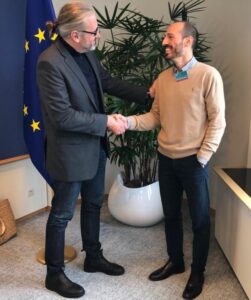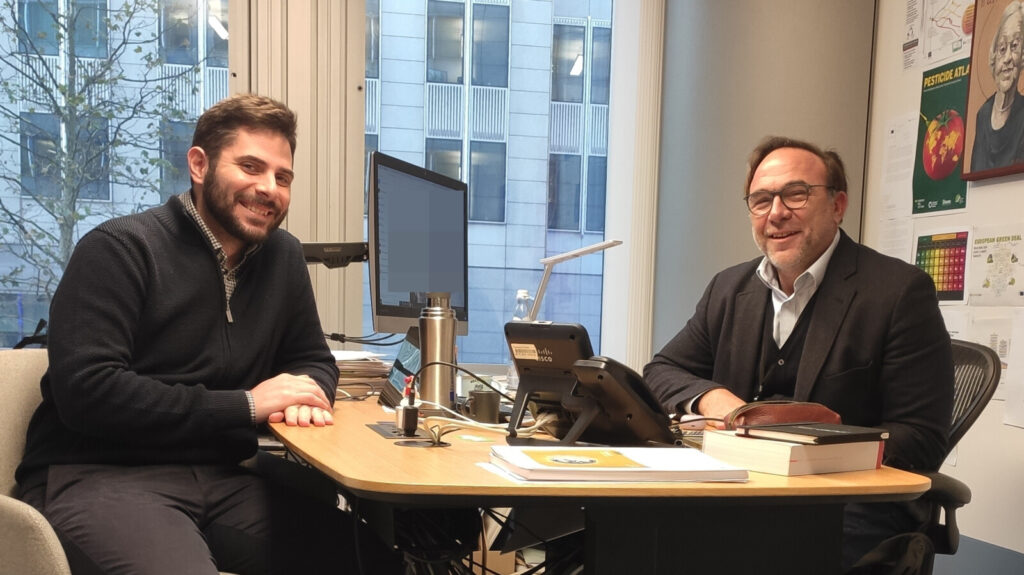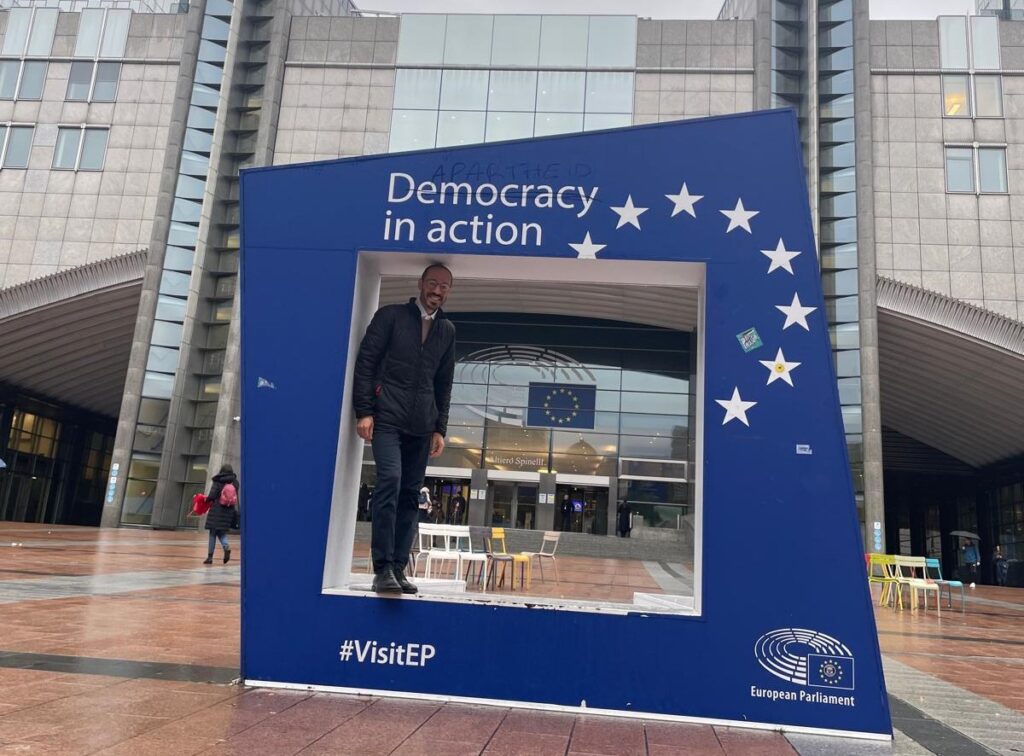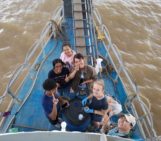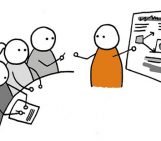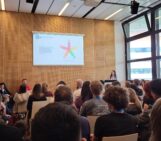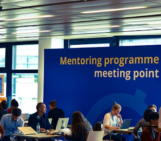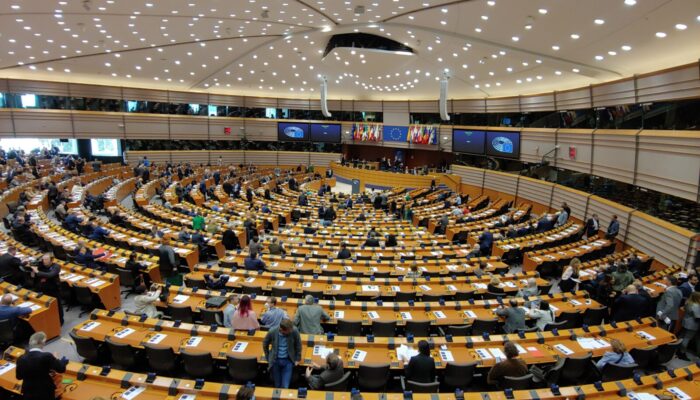
Each year, the EGU’s Science-Policy Pairing Scheme offers selected EGU members the opportunity to experience life inside the European Parliament. This Pairing Scheme aims to promote evidence-informed policymaking, provide the scientists involved with insights about how Members of the Parliament (MEPs) use research in their decision-making, and encourage stronger science-policy partnerships! For this month’s blog post, I had the privilege of interviewing Daniele la Cecilia and Stelios Karozis, the two selected candidates from EGU’s 2023 Science-Policy Pairing Scheme, to learn more about their experiences inside the European Parliament and their key take-home messages!
Hi Daniele and Stelios! Thanks for taking the time to share your experiences from inside Parliament. First, can you tell us a bit more about yourselves?
Daniele: As a curious and proactive environmental engineer, I’ve been able to gain a broad range of 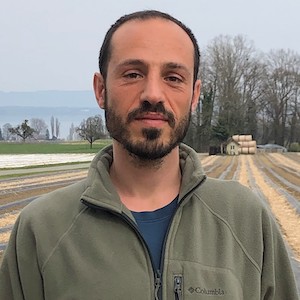 expertise spanning plant protection products monitoring and modelling, satellite remote sensing, as well as compilation and analysis of environmental data to investigate anthropogenic impacts on the environment. Currently, I have a MSCA-Postdoctoral Fellowship to research the impacts of catchment-scale greenhouse horticulture on the hydrological cycle.
expertise spanning plant protection products monitoring and modelling, satellite remote sensing, as well as compilation and analysis of environmental data to investigate anthropogenic impacts on the environment. Currently, I have a MSCA-Postdoctoral Fellowship to research the impacts of catchment-scale greenhouse horticulture on the hydrological cycle.
Stelios: I am a Research Associate at National Centre for Scientific Research “Demokritos” (NCSRD). 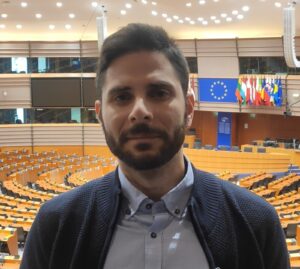 I hold a Chemical Engineer diploma, a MSc degree in Computational Mechanics, a Doctorate degree in Molecular Simulation, and a MSc degree in Data Science. My research interests focus on modelling physical systems using deterministic, stochastic and data-driven techniques to improve the climate and seasonal weather prediction of models and climate simulations using Deep Learning and Big Data Analytics, and the use of the forecasting data to various applications, such as risk assessment of critical infrastructures.
I hold a Chemical Engineer diploma, a MSc degree in Computational Mechanics, a Doctorate degree in Molecular Simulation, and a MSc degree in Data Science. My research interests focus on modelling physical systems using deterministic, stochastic and data-driven techniques to improve the climate and seasonal weather prediction of models and climate simulations using Deep Learning and Big Data Analytics, and the use of the forecasting data to various applications, such as risk assessment of critical infrastructures.
As a researcher, what motivates you to engage in policy and learn more about the policymaking process?
Daniele: We live in a democratic continent, and we should behave for the greater good of society. Policies have an impact on our daily life as a society. I believe scientists should provide timely and relevant information to support evidence-based policymaking to ensure that the policies made are effective and beneficial.
Working towards environmental protection is particularly challenging because the consequences of degrading ecosystems are seen in the very long run, which goes against the time scale of political mandates. My job in research fits me because I am allowed to explore creative solutions to societal issues. And I am also driven by my vocation to protect the environment.
The reward of publishing scientific papers helps my career. But to feed my vocation, I need to reach out to policymakers. So I applied for the pairing scheme to learn how this process works and to understand the challenges of working with policymakers.
It’s difficult to understand the complexities of policymaking when we stay inside of our academic bubble – it may seem obvious that all the evidence points to a single straightforward decision. But different stakeholders have different perspectives and values and often see the same situation in a very different way. I think it’s important for us to try to understand these different perspectives and the many things that policymakers have to consider when we’re providing evidence to policymakers.
Stelios: I’m currently participating in a Technical Support Instrument project that is supported by the European Commission. As a multi-country reform project, it aims to build capacity for evidence-informed policymaking in governance and public administration. As part of this project, I represented Greece in a Training of the Trainers Workshop that was led by the Joint Research Centre of the European Commission. During this Workshop and by participating in the Technical Support Instrument project, I learned about the role of “knowledge brokers”, intermediaries that aim to bridge the gap between scientists and policymakers to ensure that relevant research findings can be used during the decision-making processes.
I applied for the EGU Science-Policy Pairing Scheme as I believed it would improve my understanding of this role and provide me with valuable skills that could help me pursue this role in the future.
I also saw it as a good opportunity to utilise the skills provided by the Training of the Trainers program and help me in the implementation of the Technical Support Instrument project in Greece.
What were some of the most interesting activities or tasks that you undertook during your time inside the Parliament?
Daniele: During my week in the Parliament, there was a strong focus on the Soil Monitoring Law.
Martin Hojsik, the Member of the European Parliament (MEP) that I was paired with, is the rapporteur of this legislation which means that he and his team are responsible for drafting a report with the help of experts that is then used by the Committee during the legislative process. While I was there, they were at the final stage of drafting the proposal and were trying to hear as many perspectives as possible to ensure the amendments and edits included were effective. The whole week was full of meetings with lobbyists, policy advisors, and assistants of other MEPs. There was also a public hearing with stakeholders, who joined in person and online.
Because I had been warned about the schedule, I arrived prepared with my comments on the publicly available draft proposal. I discussed my comments with Hojsik’s team soon after my arrival. One task that I did beforehand was to reach out to my network and ask for their feedback on the monitoring law. Those that responded to my requests were so knowledgeable that prepared me for the week in the Parliament and enabled me to provide accurate and useful scientific evidence. During the week in the Parliament, I was an active listener during the many meetings and I was also responsible for answering the more technical questions directed at our team.
Stelios: My placement took place during a “Committee” week in the European Parliament. This is when the parliamentary committees (for example the Committee on Environment, Public Health and Food Safety and Committee on Industry, Research and Energy) focus on their specific tasks, such as reviewing legislation, conducting inquiries, and holding hearings with experts, officials, or stakeholders. I had the opportunity to observe discussion on Agriculture, Energy and Environmental subjects. On many occasions I was asked to give inputs/clarification during the committees. The most interesting session was the last; it was a trialogue between the Council, the Commission and the Parliament. It was very interesting observing and guessing what the goals of each party were and how it was hidden in the revisions that each one was proposing.
What surprised you most about the European Parliament and how decision-making takes place?
Daniele: Perhaps I was naïve, but what surprised me the most was the wide range of policies that MEPs work on. For example, we were primarily working on the soil directive. But during the same week there were also discussions on methane emissions, pollinator protection, PFAS restrictions and the discussions on whether to allow for the use of possibly skin sensitizers in refill liquid (to curb plastic use with affordable solutions) used as detergents. While the central theme during my visit was always about environmental protection, very different backgrounds were required to understand each situation. While MEPs rely on scientific assistants and a network of policy advisors to support them, it seems like there still needs to have more researchers from a wider range of institutions involved in this process to ensure that MEPs receive comprehensive evidence.
Stelios: I was lucky to be present in the voting of Nature Restoration Law. The room was packed with MEPs and observers, all waiting the results. The voting was expected to be marginal in favour of passing and everybody was on edge. The MEPs voted and the result was positive! Everybody was happy and excited, including me. Immediately after, I learnt that there will be another (third) voting process early 2024. I was surprised on how many steps there are until something is considered approved by the EU parliament.
What did you learn along the way?
Daniele: Democracy is about understanding different people want different things from the same situation. So be prepared to compromise with all the parties.
Scientists can be lobbyists too and if we want our evidence to be used, we need to engage policymakers in a structured way because everyone in the parliament is very busy. For example, it is common for organisations and lobbyists to suggest edits to a proposed legislation similar to how researchers make internal revisions before submitting a manuscript to a journal. However, if research groups are to do this with a legislation, it’s important for them to understand that evidence has to be transformed into something easy to implement in a law and to be assessed in the future.
Stelios: The scientists need to be more involved in the process and it is the only way to bilaterally train scientists and policymakers to understand each other and work together, whenever is relevant.
It also seems like at least some of the evidence requests comes from MEPs on an ad hoc basis so it’s important to be in the right place at the right time.
What tips would you give to researchers participating in the Pairing Scheme in the future?
Daniele: Stay flexible because no one really knows for sure what is going to come on one’s desk. However, if you know the topics you will be working on in advance, reach out to your scientific network beforehand and prepare! I would also recommend listening to podcasts on relevant policy related issues and building up general knowledge on current debates in the EU agenda.
Stelios: Expect the unexpected! And approach the process with the scientific method; observe, gather data, ask questions, formulate a theory about how thinks work in the parliament, discuss it with the MEP and his/her team to validate it, repeat the steps.

